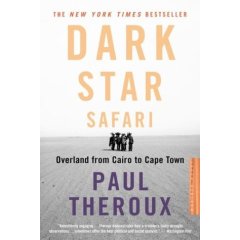Paul Theroux’s Dark Star Safari: A Review

.
Reviewed by Tom Davis
Paul Theroux’s most recent travel narrative, Dark Star Safari: Overland from Cairo to Cape Town (Houghton Mifflin, 2003) is a vivid reminder that there are two types of travel. In one form, a person can be transported from the familiar to the foreign quickly, and in relatively comfortable fashion. “Not too dirty,” Theroux observes. “Nice food. Courteous people. Sunshine. Lots of masterpieces. Ruins all over the place.”
The other form of travel—the form through which Theroux traverses Africa—reminds us that “travel is transition.” It’s the type of travel that requires “going slowly, crossing national frontiers, scuttling past razor wire with my bag and passport,” the whole time “being reminded that there was a relationship between Here and There, and that a travel narrative was the story of There and Back.”
This in mind, the reader of Dark Star Safari should brace himself like Theroux does: for moments of happiness along with all the expectations of misery, encountering the picturesque while expecting the appalling.
Dark Star Safari is in great part Theroux’s own story of his relationship with Africa. As a young man serving in the Peace Corps during the early 1960s, Theroux worked in Malawi as a teacher. It was during that period that the author “got a glimpse of the pattern my life would take”; to Theroux “Africa, “for all its perils, represented wilderness and possibility.”
Thus, when the author returns to visit his old school, he returns in anticipation of a happy reunion with the place he associates with his youthful aspirations. Unfortunately, what he discovers upon his return bears a disheartening contrast to the place of his youth. Theroux feels like “a wraith from the past, knocking on broken windows with my bony fingers, pressing my skull against the glass and looking death’s-head toothy, and saying, Remember me?” At times like this, Dark Star Safari reads like a man looking up an old friend after years of absence, and decrying, “I managed to keep myself in shape! How could you have let yourself go like this?”
Theroux is reflexively critical if anything, which is why he has the distinction of being one of the most insightful – yet dyspeptic – travel writers out there. In a 2003 article, the New York Times Book Review observed that Theroux has “a skeptic’s instinct for deflating myths, bringing irony to an essentially romantic form.” Other readers of Dark Star Safari have accused him of being everything from a post-colonial imperialist to a “hater” of aid-workers and missionaries. Indeed, the book does strike hard at the corrupt, beggarly state of many African nations — as well as the hypocritical, self-righteous behavior of do-gooders who travel to Africa under the auspices of humanitarianism or Christian philanthropy.
That said, however, Theroux is most successful in Dark Star Safari when he focuses on his “travel is transition” methodology, pointing out its power to soften the effects of globalization on individual Westerners and Africans alike.
In a 2004 radio interview, Paul Theroux suggested there were things individual Westerners could do to help in Africa:
I would say go to [that place you want to affect] first, walk around. Have your b.s. detector finely calibrated and then go to a village, go to villages, travel around, talk to people, ask questions about the government. In other words, before you do something, pre-ramble the territory and see what they need. Actually, I think what people need doesn’t come from the outside; it has to come from the inside.
I’m not so sure that this statement offers a complete solution to the world’s current situation so much as it suggests how long-term travel (as well as reading travel narratives) can, in a small way, inoculate travelers against the jading hype of mass-media culture. Near the conclusion of Dark Star Safari Theroux observes:
Huck never returned from ‘the Territory’ [. . .]. Captain Gulliver went home, wiser but also alienated and revolted, not by the trip but by the domestic scene [. . .]. Travel had changed him. You go away for a long time and return a different person—you never come all the way back. Like Rimbaud, you think, I is someone else.
Readers of Dark Star Safari will certainly relate.
.
Note: Formerly a Sweden-based expatriate, Tom Davis teaches English at Wichita East High School in south-central Kansas. His review is part of an ongoing series featuring guest reviews of travel books on Vagablogging.net. Previously, Bill Jenkins reviewed Travels With My Chicken, by Martin Gurdon. To review a travel book for this site, send a proposal to Rolf at the contact address in the left index bar.

Category: Travel Writing